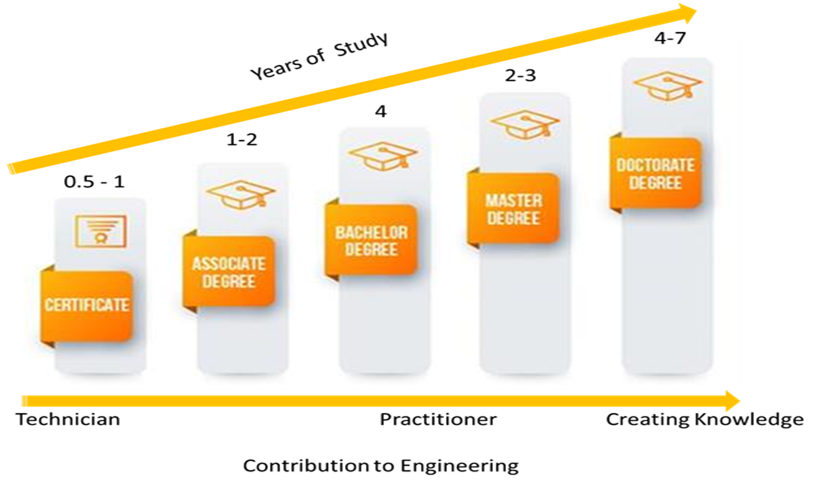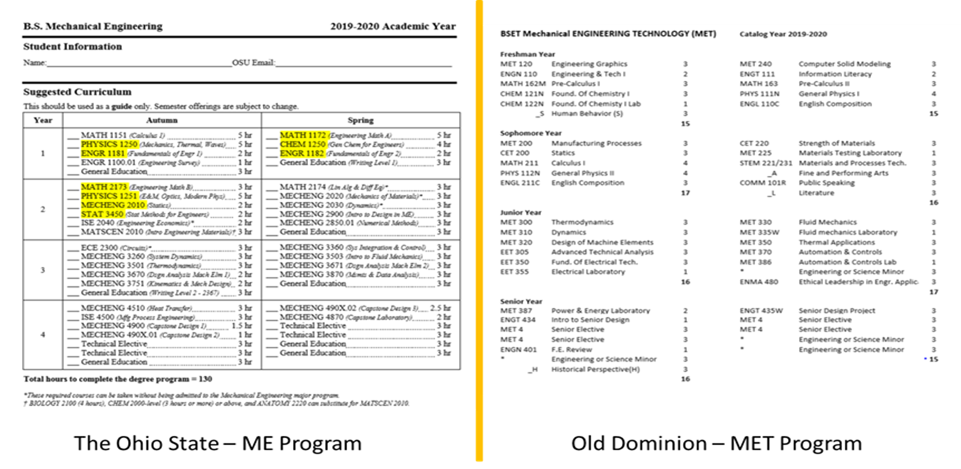Engineering Technology Degrees
Mechanical engineering technology degrees are great option for formal engineering education. But, you should know what you are getting, before diving into your studies.
Despite the rise in quality engineering technology programs, there are mixed perspectives on the roles engineering technology graduates can fill. Underestimating the value of an engineering technology bachelor degree is largely due to a lack of understanding the curriculum in comparison to an associate degree. Let’s take a look at the continuum of formal engineering education available after high school to establish the basics. Keep in mind formal education does not an engineer make! It’s all in how you use the knowledge gained.

This is a generalization. However it is reflective of what is expected at each level of education. At the technician level, your education should prepare you to execute tasks, services, and basic troubleshooting. Theory is provided to give technicians basis for troubleshooting. As you begin to shift to the right along the contribution axis education focuses on giving theory to not only troubleshoot but to design systems using theoretical principles. At the highest level of formal education, candidates should be contributing new knowledge that will eventually drive new applications.
Now let’s delve into the engineering technology bachelor degree (ETAC) by means of comparing to a traditional engineering bachelor degree (EAC). The American Society of Engineering (ASME) released the diagram below to depict the educational outcomes for the two courses of study.

Engineers will find the ASME perspective dominates in academia as well as many industries. However if we explore the curriculum of an ABET approved program for each, it helps understand the key differences and perhaps more importantly the synergies.

Shifting a few courses within engineering technology curriculum, the foundations of both programs are nearly identical. Courses to consider changing in the early years are likely in mathematics and physics (or applicable sciences). Upper level courses will begin to diverge more in teaching approach, with the engineering technology programs emphasizing practical mathematic approximations and hands on project work as reinforcement. This distinguishing approach can be a strategic advantage in our ever changing world. An engineer capable of building the solution just as well as comprehending the design principles behind it, is the gold standard.
It all comes down to what approach maximizes your ability to get the outcomes you desire. If you choose the technology route, make sure you take care to develop your theoretical understanding. If you choose the classical engineering route make sure to couple it with clubs and electives that allow you to develop hands on skills. Whatever you do, avoid being the engineer that designs the unbuildable or malfunctioning solution from lack of understanding the practical problem at hand or ignorance of the scientific principles at play.
If you do choose an engineering technology program, you can expect resistance as you push against the stigma of engineering technology degrees. Rest assured if attacked with the right mindset you will have all the tools needed to succeed in any career path with the added bonus of application based knowledge under your belt. Choose well. Enjoy the journey.
Author Bias : If you couldn’t tell, I choose the engineering technology route and can attest to the inferiority stigma about this option, but I wouldn’t change a thing. I am excited by abstract science, I am an avid builder, and highly resolved (which comes in handy for busting those barriers down). Do your homework when picking, think about what you enjoy and what you might want to do after graduation and plan accordingly.
Resources :